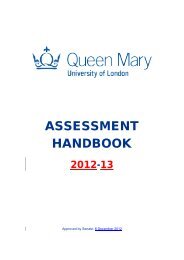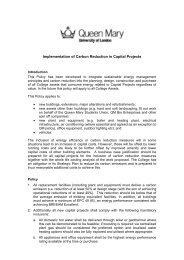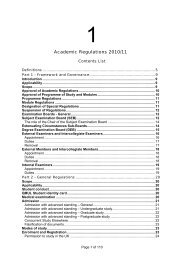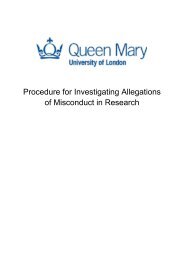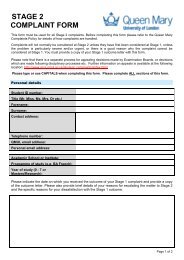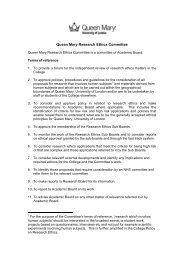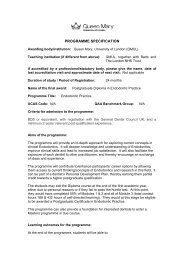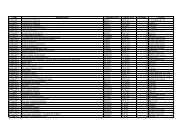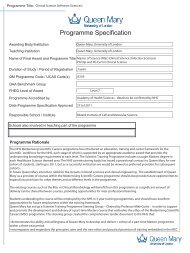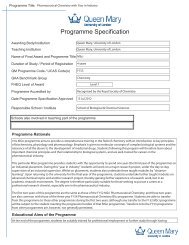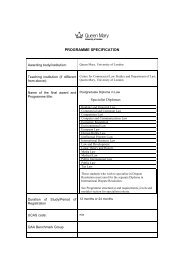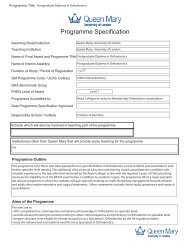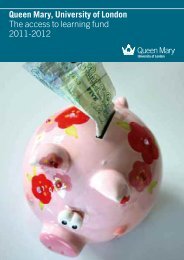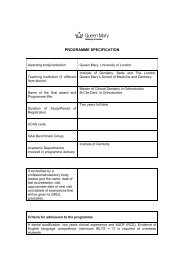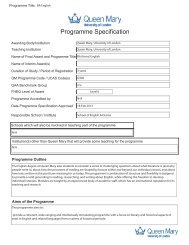PROGRAMME SPECIFICATION - Queen Mary, University of London
PROGRAMME SPECIFICATION - Queen Mary, University of London
PROGRAMME SPECIFICATION - Queen Mary, University of London
Create successful ePaper yourself
Turn your PDF publications into a flip-book with our unique Google optimized e-Paper software.
<strong>PROGRAMME</strong> <strong>SPECIFICATION</strong><br />
Awarding body/institution:<br />
<strong>Queen</strong> <strong>Mary</strong>, <strong>University</strong> <strong>of</strong> <strong>London</strong><br />
Teaching institution (if different<br />
from above):<br />
N/A<br />
Name <strong>of</strong> the final award and<br />
Programme title:<br />
BSc (Hons)<br />
Biology<br />
Duration <strong>of</strong> Study/Period <strong>of</strong><br />
Registration<br />
3 years<br />
UCAS code:<br />
C100<br />
QAA Benchmark Group<br />
Biosciences<br />
Academic Department/s<br />
involved in programme delivery<br />
School <strong>of</strong> Biological and Chemical Sciences<br />
If accredited by a<br />
pr<strong>of</strong>essional/statutory body,<br />
please give the name, date <strong>of</strong><br />
last accreditation visit,<br />
approximate date <strong>of</strong> next visit<br />
and details <strong>of</strong> exemptions that<br />
will be given to QMUL<br />
graduates.<br />
N/A
Criteria for admission to the programme<br />
Candidates must be able to satisfy the general admissions requirements <strong>of</strong> the <strong>University</strong>.<br />
This is usually achieved in one <strong>of</strong> the following ways:<br />
<br />
<br />
<br />
Normally 280 points at A2 level<br />
Biology (or equivalent) A2 is required.<br />
Chemistry A2 or AS is desirable but not essential.<br />
Aims <strong>of</strong> the programme<br />
The specific purposes <strong>of</strong> the programme are to:<br />
C100 Biology is designed to provide students with an understanding <strong>of</strong> the living world across<br />
a wide range <strong>of</strong> levels <strong>of</strong> biological organisation, from molecules to ecosystems. Students will<br />
be able to choose to specialise on particular fields within biology or to take a more integrated<br />
approach to their degree by covering a broad range <strong>of</strong> modules (subject to timetabling<br />
constraints – see below). Due to the flexible nature <strong>of</strong> the degree, students can tailor the<br />
degree to a large extent, to suit their own particular interests and educational objectives.<br />
Students following this programme will receive instruction in key biological concepts, the<br />
theories that underpin these concepts, and the applications <strong>of</strong> biological knowledge to<br />
important problems facing the world today (e.g., emerging human diseases; climate change).<br />
In addition to developing key biological skills, students will also develop essential transferable<br />
skills that will further strengthen their future career prospects.<br />
Furthermore to:<br />
<br />
<br />
<br />
Provide a rational, flexibly structured and coherent programme <strong>of</strong> study which is relevant<br />
to the needs <strong>of</strong> employers, facilitate the pr<strong>of</strong>essional development <strong>of</strong> the student and lay<br />
the foundations for a successful career to the benefit <strong>of</strong> the economy and society;<br />
provide a sound knowledge base in the fields studied and develop key transferable skills<br />
in the areas <strong>of</strong> communication, numeracy, information technology, working with others,<br />
problem solving, time and task management;<br />
foster the development <strong>of</strong> an enquiring, open-minded and creative attitude, tempered with<br />
scientific discipline and social awareness, which encourages lifelong learning.<br />
Learning outcomes for the programme<br />
The programme provides opportunities for students to develop and demonstrate knowledge<br />
and understanding, qualities, skills and other attributes in the following areas:
A. Knowledge and understanding<br />
To gain knowledge and understanding <strong>of</strong> general biology. The program builds on<br />
fundamental knowledge and understanding <strong>of</strong> biology as a whole, with the possibility<br />
for students to specialise on particular areas (e.g., whole organism biology as<br />
opposed to more biochemical, molecular or microbial aspects) or to take a more<br />
holistic overview <strong>of</strong> the discipline by integrating across a wide range <strong>of</strong> fields. This is<br />
the most flexible programme <strong>of</strong>fered within SBCS, as students are fee to take a wide<br />
range <strong>of</strong> options (excluding specific biomedical modules).<br />
A1. To understand how biological systems operate over a range <strong>of</strong> levels <strong>of</strong><br />
organisation, from molecules to ecosystems.<br />
A2. To appreciate the importance <strong>of</strong> variation in biology (e.g. genetic diversity within<br />
humans; biodiversity and species richness in ecosystems) and how to deal with it<br />
(e.g. via data handling and use <strong>of</strong> statistical techniques).<br />
A3. To understand the dynamics and structure <strong>of</strong> biological systems (e.g. protein<br />
structure; enzyme kinetics; population dynamics).<br />
A4. To understand cause-and-effect relationships and the role <strong>of</strong> experiments in<br />
testing (and developing) biological theories. Students should develop a knowledge <strong>of</strong><br />
the general scientific process, and how it is applied to biological systems in particular.<br />
A5. To understand how biological systems respond to perturbations (e.g. infections<br />
<strong>of</strong> pathogens; climate change in ecosystems) and to recognise the symptoms <strong>of</strong><br />
those responses (e.g. disease in humans; global species loss).<br />
B. Intellectual skills<br />
1. Reason critically.<br />
2. Integrate theory and practice.<br />
3. Identify and formulate problems.<br />
4. Apply biological principles to the solution <strong>of</strong> problems.<br />
5. Analyse and evaluate/interpret the results <strong>of</strong> controlled experiments.<br />
6. Devise strategies for the retrieval and selection <strong>of</strong> relevant information from a<br />
wide range <strong>of</strong> sources.<br />
C. Pr<strong>of</strong>essional practical skills<br />
1. Conduct practical work efficiently and with due regard for safety.<br />
2. Use a wide range <strong>of</strong> laboratory and analytical equipment.<br />
3. Retrieve, filter and collate biological data from a variety <strong>of</strong> information sources.<br />
4. Prepare scientific/technical reports.<br />
5. Use advanced theories and concepts to explain biological phenomena.<br />
6. Apply biological knowledge to the solution <strong>of</strong> a wide range <strong>of</strong> problems.<br />
7. Use a range <strong>of</strong> computational tools and packages.<br />
8. Take notes effectively.<br />
Subject to areas <strong>of</strong> specialisation ....<br />
9.<br />
Plan, undertake and report a bibliographically-based piece <strong>of</strong> research.
D. Transferable skills<br />
1. Communicate effectively by written and/or verbal means.<br />
2. Manage time, prioritise workloads and work to deadlines.<br />
3. Capacity for independent learning.<br />
4. Ability to work independently.<br />
5. Participate constructively as a member <strong>of</strong> a group/team.<br />
6. Apply biological knowledge and problem solving skills in a wide range <strong>of</strong><br />
theoretical and practical situations.<br />
7. Assess the relevance, importance and reliability <strong>of</strong> the ideas <strong>of</strong> others.<br />
8. Ability to locate information and be competent in the use <strong>of</strong> computer-based<br />
technology.<br />
9. Awareness <strong>of</strong> the role and impact <strong>of</strong> science in society.<br />
Teaching, learning and assessment strategies<br />
A. Knowledge and understanding<br />
Acquisition <strong>of</strong> knowledge is achieved mainly through lectures and, in some cases,<br />
directed independent learning. Understanding is reinforced through a combination <strong>of</strong><br />
tutorial workshops, problem classes and laboratory classes (depending upon the<br />
module concerned), including regular feedback on submitted work. Additional support<br />
is provided through the self-access facilities <strong>of</strong> the QMUL Student PC Service.<br />
Assessment<br />
Testing <strong>of</strong> the knowledge base is generally through a combination <strong>of</strong> unseen written<br />
examinations and assessed coursework. The exact nature <strong>of</strong> the coursework varies<br />
from module to module and may include work in the form <strong>of</strong> laboratory experiment<br />
write-ups, essays and/or problem sheets. The coursework mark may also include a<br />
contribution from computer-based assessments and in-course tests. Specific<br />
modules (if taken) include assessed oral examinations, oral presentations and<br />
extended reports/dissertations.<br />
B. Intellectual skills<br />
Intellectual skills (1-6) are developed through the teaching and learning programme<br />
outlined above.<br />
Analysis and problem-solving skills (3-4) are developed, in particular, through<br />
problem/example classes and tutorial workshops, whilst practical classes <strong>of</strong>fer the<br />
opportunity to integrate skills (2) and improve those relating to analysis and<br />
interpretation (5).<br />
Project work (if undertaken) <strong>of</strong>fers students the opportunity to demonstrate<br />
achievement<br />
in skills 1 and 6.
Assessment<br />
Intellectual skills (1-4) are partly assessed by formal examination, but the main<br />
vehicle <strong>of</strong> assessment for all skills is coursework (especially problem sheets,<br />
practical laboratory reports and project dissertations).<br />
C. Pr<strong>of</strong>essional practical skills<br />
Biological practical skills (1-4, 7) are developed in a progressive manner throughout<br />
the programme. In the lower levels attention is concentrated on the basic skills and<br />
safe working practice, while at higher levels more advanced techniques and non-<br />
concepts (5 - 6) is similarly built-up<br />
prescribed exercises are introduced.<br />
Skill in the application <strong>of</strong> biological theories and<br />
by a progression <strong>of</strong> graded problem classes.<br />
Other skills (8, and elements <strong>of</strong> 7) are not explicitly taught, but are nurtured through<br />
the provision <strong>of</strong> primers/guidance notes.<br />
Assessment<br />
Biological practical skills and report-writing skills (1-4) are assessed through written<br />
laboratory reports, which include attention to quantitative accuracy.<br />
Skills 5-6 are assessed through a combination <strong>of</strong> coursework and formal written<br />
examination.<br />
Skill 7 is assessed as part <strong>of</strong> the coursework <strong>of</strong> specific modules.<br />
.<br />
D. Transferable skills<br />
Transferable skills are developed in a contextual manner throughout the teaching<br />
and learning programme outlined above.<br />
Specific skills may be developed further in particular modules (e.g. project modules),<br />
but this depends on the details <strong>of</strong> each individual's programme <strong>of</strong> study.<br />
Assessment<br />
Many <strong>of</strong> the transferable skills (e.g. 1-2, 4, 6, 8) are indirectly assessed as part <strong>of</strong> the<br />
normal assessment processes for the programme.<br />
Programme structure(s) and requirements, levels and modules<br />
Students are required to register for modules to a value <strong>of</strong> 120 credits (normally eight<br />
modules) in each academic year; normally consisting <strong>of</strong> 60 credits (four modules) in<br />
each semester.<br />
Year 1<br />
A total <strong>of</strong> 120 credits at level 4 should be undertaken, each module corresponds to 15 credits.<br />
Each<br />
student undertakes the following modules:
Semester 1<br />
Essential Skills for Biologists (compulsory)<br />
Cell Dynamics (option)<br />
Chemistry for Biologists (option)<br />
Ecological and Environmental Techniques (option)<br />
Foundations <strong>of</strong> Organic Chemistry (option)<br />
Hereditary and Gene Action (option)<br />
The Diversity <strong>of</strong> Life (option)<br />
Introductory Chemistry (option)<br />
Semester 2<br />
Essential Skills for Biologists (compulsory)<br />
Basic Biochemistry (option)<br />
Conservation and the Environment (option)<br />
Evolution (option)<br />
Organic Functional Group Chemistry (option)<br />
Normal progression requirements:<br />
Taken modules to a value <strong>of</strong> 120 credits with a minimum <strong>of</strong> 90 credits passed from<br />
developmental year one.<br />
Outcomes developed/ assessed at this level include:<br />
Knowledge as indicated by selected module titles and specifications.<br />
Skills: B2-6; C1,2,4,6-8; D1-4,6,8<br />
Year 2<br />
A total <strong>of</strong> 120 credits at level 5 should be undertaken, each module corresponds to 15 credits.<br />
Each student undertakes the following modules:<br />
Semester 1<br />
Animal Physiology (option)<br />
Aquatic Invertebrates (option)<br />
Cell Biology and Developmental Genetics (option)<br />
Evolutionary Genetics (option)<br />
General Microbiology (option)<br />
Membrane Biochemistry (option)<br />
Populations, Communities and Ecosystems (option)<br />
Techniques for Biological and Chemical Sciences (option)<br />
Transmission Genetics (option)<br />
Semester 2<br />
Aquatic Ecosystems: Structure and Function (option)<br />
Basic Immunology (option)<br />
Chemistry <strong>of</strong> Biological Molecules (option)<br />
Fish Biology and Fisheries (option)<br />
Fundamentals <strong>of</strong> Neurobiology (option)<br />
Genes and Bioinformatics (option)
Global Change Biology (option)<br />
Metabolic Pathways (option)<br />
Microbial Physiology and Growth (option)<br />
Normal progression requirements:<br />
Taken modules to a value <strong>of</strong> 120 credits with a minimum <strong>of</strong> 180 credits passed from<br />
developmental years one and two.<br />
Outcomes developed/ assessed at this level include:<br />
Knowledge as indicated by selected module titles and specifications.<br />
Skills: B1-6; C1-8(9); D1-6,8,9<br />
Year 3<br />
A total <strong>of</strong> 120 credits at level 6 should be undertaken, each module corresponds to 15 credits<br />
(unless otherwise stated below). Each student undertakes the following compulsory modules:<br />
Semester 1<br />
Research Project (30 credits) OR Investigative Project (15 credits) OR Project Skills in the<br />
Life Sciences (30 credits) (compulsory)<br />
Integrative Studies in Biological Sciences (compulsory)<br />
Behavioural Ecology (option)<br />
Endocrine Physiology and Biochemistry (option)<br />
Freshwater Biology (option)<br />
Population and Chromosome Genetics (option)<br />
Human Genetics and Genomics (option)<br />
Membrane Proteins (option)<br />
Molecular Basis <strong>of</strong> Disease (option)<br />
Semester 2<br />
Research Project (30 credits) OR Investigative Project (15 credits) OR Project Skills in the<br />
Life Sciences (30 credits) (compulsory)<br />
Integrative Studies in Biological Sciences (compulsory)<br />
Aquatic Ecosystems: Science, Policy and Management (option)<br />
Developmental Biology and Cell Signalling (option)<br />
Enzyme Catalysis (option)<br />
Functional Genomics and Epigenetics (option)<br />
Mammals and Evolution (option)<br />
Neuroscience: from Molecules to Behaviour (option)<br />
Parasites and Infectious Disease (option)<br />
Topics in Public Health Microbiology (option)<br />
Out <strong>of</strong> term<br />
Tropical Ecology & Conservation (option)<br />
Turtles,<br />
Seals, Whales and Dolphins (option)
BSc(Hons) Degree<br />
Requires undertaking modules to the value <strong>of</strong> 360 credits, normally with a minimum <strong>of</strong> 90<br />
credits at academic level 6 and 90 credits at academic level 5.<br />
Requires passing modules to the value <strong>of</strong> 270 credits.<br />
Outcomes developed/ assessed at this level include:<br />
Knowledge as indicated by selected module titles and specifications.<br />
Skills: B1-6; C1-8(9,10); D1-9<br />
Quality assurance mechanism (please include details <strong>of</strong>: SSLC meetings,<br />
student feedback mechanisms, personal tutor arrangements, programme<br />
induction, programme review and monitoring.)<br />
Method <strong>of</strong> evaluating and improving the quality and standard <strong>of</strong> teaching and<br />
learning<br />
Programme reviews are undertaken on an annual basis by the Programme co-ordinator and<br />
their deputy, reporting back to the Departmental Teaching & Learning Committee (TLC).<br />
These reviews are based on:<br />
reviews <strong>of</strong> individual modules.<br />
external examiner reports.<br />
feedback from (and actions initiated by) the TLC.<br />
Committees with responsibility for monitoring and evaluating quality and standards<br />
<br />
<br />
<br />
<br />
<br />
Staff/Student Liaison Committee<br />
School Teaching & Learning Committee (TLC)<br />
Examination Board (EB).<br />
Science Degree Examination Board (DEB).<br />
Academic Quality Assurance Committee.<br />
Mechanisms for monitoring and improving quality <strong>of</strong> individual staff teaching<br />
Newly appointed staff are usually expected to have a PhD level <strong>of</strong> qualification (or equivalent<br />
levels <strong>of</strong> qualification and experience. Those appointees who have less than three years fulltime<br />
experience in a full-time academic role, including research and teaching, are<br />
recommended to complete the Postgraduate Certificate in Academic Practice (PGCAP)<br />
during the first three years <strong>of</strong> their probation. The PGCAP is a 2-year Masters level ILTaccredited<br />
programme leading to a Postgraduate Certificate in Academic Practice, awarded<br />
by <strong>Queen</strong> <strong>Mary</strong>, <strong>University</strong> <strong>of</strong> <strong>London</strong>.<br />
For all staff, feedback on performance (and monitoring there<strong>of</strong>) is provided by:<br />
- module feedback questionnaires<br />
- staff appraisal scheme<br />
- peer observation <strong>of</strong> teaching.<br />
Further opportunities for development are provided by the Educational and Staff Development<br />
Programme.<br />
Mechanism for gaining student feedback on the quality <strong>of</strong> teaching and their learning<br />
experience.
- Staff/Student Liaison Committee<br />
- module feedback questionnaires<br />
Further informal feedback is provided by means <strong>of</strong> contact with<br />
tutorial classes, and through meetings with student advisees.<br />
students in laboratory and<br />
Employers Links<br />
Please provide details <strong>of</strong> any links with employers e.g.<br />
• Details <strong>of</strong> advisory panels that include current or potential employers;<br />
• Organisations that regularly employ graduates from this programme<br />
and the roles that graduates undertake.<br />
• Student prizes donated by organisations that may <strong>of</strong>fer employment to<br />
graduates from this programme.<br />
If there are no links with employers consider the learning outcomes and<br />
transferable skills and explain how these might be used to inform employers<br />
about the qualities and skills a graduate from this programme might be<br />
expected to have.<br />
Half our graduates find work or further training in the life sciences including teaching,<br />
research or environmental monitoring and regulation, sales work and careers in the growing<br />
biotechnology industry. The remaining half move on to other jobs or further training but take<br />
transferable skills from a scientific education: numeracy, computer literacy, data handling and<br />
analysis, descriptive and critical writing, familiarity with biotechnology and scientific methods.<br />
Recent graduate roles include:<br />
laboratory technician,<br />
data analyst,<br />
public health <strong>of</strong>ficer,<br />
market researcher.<br />
NHS administrator,<br />
medical representative,<br />
Person Completing<br />
Programme Dr Mark Trimmer<br />
Specification<br />
Person responsible for management <strong>of</strong><br />
programme<br />
Dr Mark Trimmer<br />
Date programme specification agreed by<br />
Department or teaching and learning<br />
committee<br />
25/5/2010
Date <strong>of</strong> approval by Faculty Board/SMD<br />
Education Board<br />
Date <strong>of</strong> update/amendment 25/5/2010



